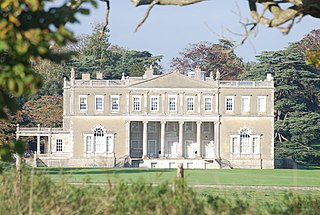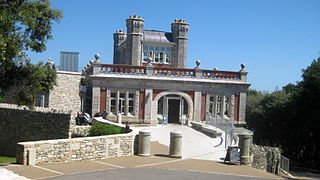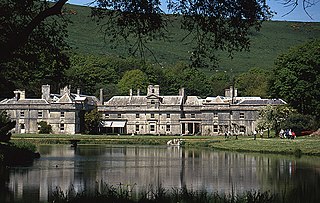
Castle Howard is a stately home in North Yorkshire, England, within the civil parish of Henderskelfe, located 15 miles (24 km) north of York. It is a private residence and has been the home of the Carlisle branch of the Howard family for more than 300 years. Castle Howard is not a fortified structure, but the term "castle" is sometimes used in the name of an English country house that was built on the site of a former castle.

Durdle Door is a natural limestone arch on the Jurassic Coast near Lulworth in Dorset, England. It is privately owned by the Weld Family who own the Lulworth Estate, but it is also open to the public.

Durlston Country Park is a 320-acre country park and nature reserve stretching along the coast of the Isle of Purbeck on the outskirts of Swanage in Dorset, England. The park is a popular destination for tourists to enjoy the walks, views, visitor centre, climbing, and wildlife, including Durlston Castle, the Great Globe, Tilly Whim Caves, and Anvil Point Lighthouse. It is a gateway to the Jurassic Coast World Heritage Site, forms part of the 630 mile South West Coast Path, and is owned by Dorset Council.

Sherborne Castle is a 16th-century Tudor mansion southeast of Sherborne in Dorset, England, within the parish of Castleton. Originally built by Sir Walter Raleigh as Sherborne Lodge, and extended in the 1620s, it stands in a 1,200-acre (490 ha) park which formed a small part of the 15,000-acre (61 km2) Digby estate. Within the grounds lie the ruins of the 12th-century Sherborne Old Castle, now in the care of English Heritage.

Lulworth Castle, in East Lulworth, Dorset, England, situated south of the village of Wool, is an early 17th-century hunting lodge erected in the style of a revival fortified castle, one of only five extant Elizabethan or Jacobean buildings of this type. It is listed with Historic England as a Scheduled monument. It is also Grade I listed. The 18th-century Adam style interior of the stone building was devastated by fire in 1929, but has now been restored and serves as a museum. The castle stands in Lulworth Park on the Lulworth Estate. The park and gardens surrounding the castle are Grade II listed with Historic England.
Bestival was a four-day music festival held in the south of England. The name Bestival is a portmanteau of the words best and festival. It had been held annually in the late summer since 2004 at Robin Hill on the Isle of Wight. In 2017 the festival relocated to the Lulworth Estate in Dorset. The event was organised by DJ and record producer Rob da Bank along with his wife Josie and was an offshoot of his Sunday Best record label and club nights. The initial Bestival attracted 10,000 people, growing to 50,000 in its final year, 2018. Bestival won 'Best Major Festival' at the 2015 UK Festival Awards, having won 'Best Medium-Sized Festival' in 2005, 2006, 2007 and 2009, 'Best Major Festival' in 2010, 2012 and in 2015, 'Fan's Favourite' in 2011 and 'Best Innovation' in 2005.

The Weld family may refer to an ancient English family, and to their possible relations in New England, an extended family of Boston Brahmin. An early record of a Weld holding public office, is the High Sheriff of London in 1352, William. In the 16th and 17th centuries people called Weld and living in Cheshire began to travel and to settle in the environs of London, in Shropshire, in Suffolk and thence in the American Colonies, and in Dorset. While most of the Welds of England had adopted Protestantism, the exception was all three sons of Sir John Weld of Edmonton, who married into elite recusant families, thus reverting, with their descendants, to Roman Catholicism. The noted Catholic Weld lineage, unbroken till the new millennium, is that of Lulworth Castle in Dorset.

Crichel House is a Grade I listed Classical Revival country house near the village of Moor Crichel in Dorset, England. The house has an entrance designed by Thomas Hopper and interiors by James Wyatt. It is surrounded by 400 acres of parkland, which includes a crescent-shaped lake covering 50 acres. The parkland is Grade II listed in the National Register of Historic Parks and Gardens.

Bindon Abbey (Bindonium) was a Cistercian monastery, of which only ruins remain, on the River Frome about half a mile east of Wool in the Purbeck District, Dorset, England.
The Weld family are a cadet branch, arisen in 1843, of the English Welds of Lulworth. It is an old gentry family which claims descent from Eadric the Wild and is related to other Weld branches in several parts of the United Kingdom, notably from Willey, Shropshire and others in the Antipodes and America. A notable early Weld was William de Welde, High Sheriff of London in 1352, whose progeny moved in and out of obscurity.
Herbert Joseph Weld Blundell was an English traveller in Africa, archaeologist, philanthropist and yachtsman. He shortened his surname from Weld Blundell to Weld, in 1924.

Mupe Bay is a bay with a shingle beach to the east of Lulworth Cove in Dorset, England, and is part of the Jurassic Coast World Heritage Site.

The Castle Inn is a public house in West Lulworth, Dorset, England, which dates from the 16th century. It was originally called The Green Man, and later The Jolly Sailor. As of 2014, the pub is a popular traditional pub and hotel. The Castle Inn has a focus upon traditional real ales, real ciders and fresh food.

Durlston Castle stands within Durlston Country Park, a 1.13 square-kilometre (280-acre) country park and nature reserve stretching along the coastline south of Swanage, on the Isle of Purbeck in Dorset.

The Lulworth Ranges are military firing ranges located between Wareham and Lulworth in Dorset, England. They cover an area of more than 2,830 hectares, are leased in a rolling contract from the Weld Estate by the Ministry of Defence and are part of the Armoured Fighting Vehicles Gunnery School based at Lulworth Camp. The ranges were established in 1917.

Encombe House is a privately owned, Grade II* listed country house built in 1735 on the Encombe Estate near the village of Kingston and about 1-mile (1.6 km) inland of Dorset's Jurassic Coast in southern England. The parkland is Grade II* listed in the National Register of Historic Parks and Gardens.

Thomas Bartholomew Weld (1750–1810), known as Thomas Weld of Lulworth Castle, was a member of the English Catholic gentry, landowner, philanthropist and bibliophile. He was connected to many of the leading Catholic families of the land, such as the Bodenhams, Cliffords, Erringtons, Petres and Stourtons. He proved to be a great benefactor of the Society of Jesus in England in their educational and pastoral endeavours, as timely donor of his Stonyhurst estate in 1794. He was also a benefactor to other Roman Catholic religious and clergy. He was a personal friend of King George III. His sister-in-law was Maria Fitzherbert. After the French Revolution he hosted refugee remnants of the French royal family at his castle. He was the builder, in 1786, of the first Roman Catholic place of worship in England after the Protestant Reformation.

Edward Weld (1740–1775) was a British recusant landowner.
Edward Weld was an English gentleman of the landed gentry and a member of an old recusant family. Weld is notable for two trials, one when he was accused of impotency, the other for treason at the time of the Jacobite rising of 1745.
Humphrey Weld, DL, JP was an English lawyer, member of the Royal household, public official, landowner and property administrator who was elected to the House of Commons for Christchurch in Hampshire in 1661. Weld was a crypto-recusant who kept his religious allegiance secret in order to stay in public office during a turbulent political period in English history. He was appointed Cup-bearer to the Catholic Queen Henrietta Maria 1639-44 and later as Gentleman of the Privy Chamber 1668-85 under her son, Charles II. He served as a magistrate and in numerous other public roles in London, Middlesex, Cambridgeshire, Hampshire and in Dorset, where he was governor of Portland Castle. In 1641 he bought the Lulworth Estate in Dorset where he started the "Lulworth" line of the (recusant) Weld family which has continued for over 350 years.
















